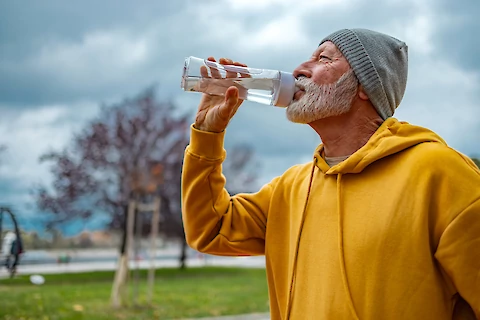
As the winter chill sets in, hydration may not be at the forefront of our minds. However, maintaining adequate fluid intake throughout the year is crucial. This is particularly true for our senior community because the potential health risks are serious, and age-related changes can make seniors more susceptible to dehydration, even when the temperature drops.
Winter Dehydration Risks for Seniors
The risk of dehydration in seniors might seem puzzling, especially during winter, but several factors contribute to this issue. As we age, the sense of thirst wanes, making it easy to forget to drink. Similarly, with age, the body's ability to conserve water drops, meaning seniors need more fluids to stay balanced. And let's not forget that certain medications can also exacerbate this situation. Winter doesn't make these issues go away.
Common Misconceptions About Hydration in Winter
It might be easy to associate hydration with hot weather, but this creates a dangerous misconception. The reality is that dry winter air can pull moisture from your body, increasing your hydration needs. Additionally, we often wear multiple layers to stay warm in winter, causing our bodies to work harder and lose more water through sweat. Remember, dehydration is not just a summer problem - it's a year-round challenge.
Practical Hydration Tips for Seniors
Now that we understand the problem, how can we fix it? Here are some ideas:
Drink Regularly
First and foremost, remember to drink regularly throughout the day. Try setting a timer as a reminder to sip water or other beverages. While water is the best option, juices, milk, and even soup can contribute to hydration.
Eat Water-Rich Foods
Include more fruits and vegetables in your diet. Many fruits and vegetables have a high water content that can supplement fluid intake. Try to avoid or limit drinks with alcohol and caffeine as they can dehydrate the body.
Carry a Water Bottle
Keeping a water bottle nearby can serve as an excellent visual cue to drink up. Remember, it's not just about how much you drink but also consistency in maintaining a steady intake of fluids throughout the day.
Recognizing Signs of Dehydration
Recognizing dehydration is the first step towards tackling it. Common signs include dry mouth, fatigue, dizziness, and confusion. More severe symptoms might include rapid heart rate, low blood pressure, and unresponsiveness. If you or a loved one notice any of these severe symptoms, please seek medical help immediately.
To prevent it from getting to that point, keep an eye out for the more subtle signs. Feeling thirsty is an obvious one, but also pay attention to how often you're going to the bathroom. Decreased urination can signal that your body isn't getting enough water.
Senior Helpers Treasure Coast Helps Seniors Stay Hydrated
Regardless of the weather, proper hydration is a critical aspect of senior health. While winter might make us less likely to reach for a glass of water, the risk of dehydration remains high for our aging loved ones.
If you or a loved one could use additional support in managing hydration or other aspects of senior health, Senior Helpers Treasure Coast is here to help. We're committed to providing professional and compassionate care to the seniors of Salerno, Stuart, Palm City, and Sebastian. Reach out to Senior Helpers Treasure Coast today to learn more about our services.